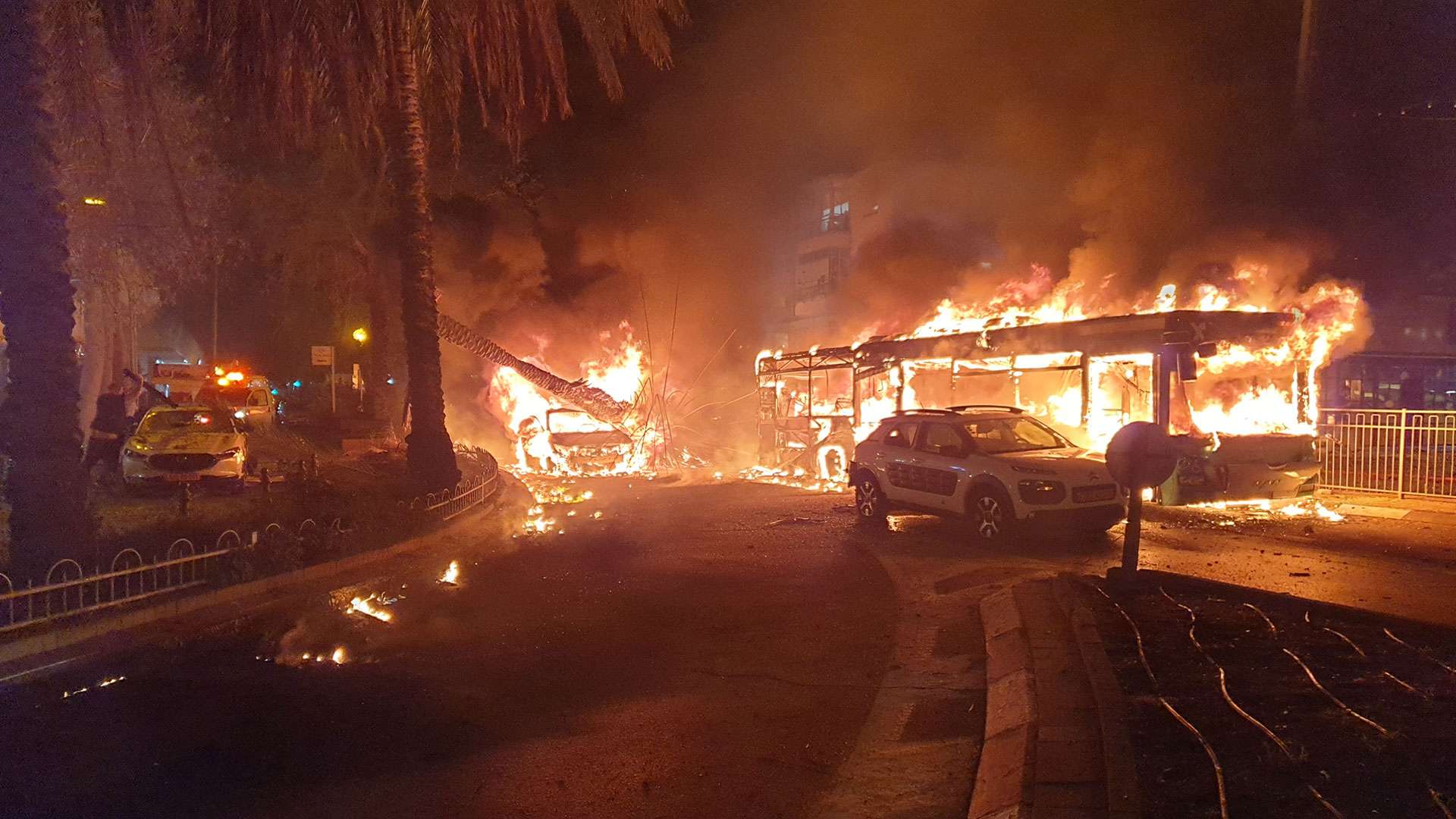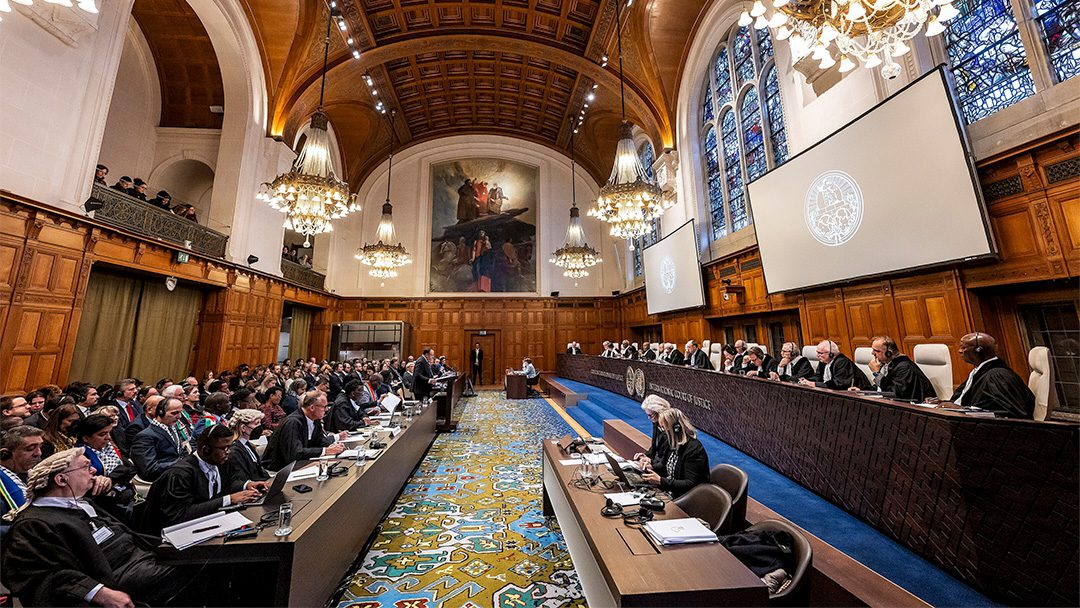The latest escalation between Israel and Hamas in Gaza, and the recent decision of the International Criminal Court to open an investigation into possible crimes committed in the context of the Israeli-Palestinian conflict, raise fundamental issues about the scope of international law and legitimacy. These issues were discussed at an international roundtable organised by ELNET-France and The Hague Initiative for International Cooperation (thinc.) on 9th June 2021.
Israel’s right to self-defence
Prof. Laurie Blank (Clinical Professor of Law, Director of The International Humanitarian Law Clinic, Emory University School of Law, Atlanta, USA) explained that Israel had a right under international law to defend itself against the recent attacks launched by Hamas from Gaza. According to Prof. Blank, “every state—like every human being—has a right under international law to self-defence. There are two basic conditions to the right to self-defence.”
Necessity
First, the use of force in self-defence is only allowed if it is “necessary” to repel or deter the attack. The fact that a terrorist organization was attacking Israel, and there was no possibility of negotiation, clearly means that a response was necessary in self-defence to end or prevent that attack. In other words, there was a necessity for Israel to respond. Second, the principle of proportionality regulates the extent of force that can be used to bring an end to the attack. Note: it is not a “tit-for-tat” or a question of symmetry. International law allows the use of force to the extent needed to end or repel the attack. As long as Hamas was continuing to launch rockets and other attacks, Israel is justified in using the amount of force needed to stop the attacks—for example, by eliminating Hamas’ military capabilities for launching attacks. The fact that Hamas, which seems like a small aggressor, is in fact a proxy of a larger, more powerful, aggressor (Iran), could potentially be relevant to this analysis as well.
Proportionality
Blank: “There is a separate concept of proportionality governing how you can fight. The law of armed conflict sets out comprehensive principles and rules to protect civilians, but also recognizes the pursuit of military objectives. This principle of proportionality in the law of armed conflict is about minimizing harm to civilians from lawful military operations. The rule is that, in the case of an attack on a lawful military objective, if the expected harm to civilians will be excessive in relation to the anticipated military gain, then you cannot carry out that attack. This requires assessing in advance the value of the target and whether the expected civilian loss will be ‘excessive’”.
Perceptions
Prof. Blank noted that the biggest challenge lies in the perception of legality and legitimacy.
“Israel is fighting a kinetic war to counter attacks against its territory and civilian population, while Hamas is fighting an information war to delegitimize Israel. Hamas uses civilian losses in Gaza to fight this war. It either uses civilians to protect it from attack by shielding military objectives—a war crime—or deliberately puts civilians in harm’s way in order to create the perception of war crimes regardless of the actual legality of Israel’s actions. Hamas thus creates the ingredients it needs in its information war, claiming to the world that Israel is using excessive force and deliberately harming civilians. This appears to be the only conflict in the world where a comparison of the number of casualties is used as a measure of legality. But there is nothing in the law that says there must be an equal number of casualties on both sides. This lack of understanding of how the law works, combined with an exploitation of that lack of understanding, makes it very difficult to combat this information war.”
The IDF’s approach to compliance with international law
Col. (Res.) Daniel Reisner (Former Head of The International Law Department of The Israeli Defence Forces) explained the background to the current round of violence.
“In the past, Hamas used Israel’s alleged ‘occupation’ of Gaza as an excuse to attack Israeli civilians. This was strange, because Israel is no longer in Gaza; Hamas was basically saying that the fact it does not like its neighbors justifies killing people. But in this case, it did not even rely on that argument; it said that certain events in Jerusalem required it to attack. It said: we have a view about those events, and if Israel does not comply with our demands, we will kill Israeli civilians. It was an extortion racket. Israel justifiably disregarded this threat, and Hamas started firing rockets at Israeli civilians.”
Reisner outlined the very careful process by which the IDF addresses and implements international law.
“Before launching any military attack, the IDF goes through a three-test process:
- The attack has to be militarily justifiable. It must “make military sense” – i.e. it must have some military advantage associated with it.
- The second question is whether the attack is “moral”, i.e. ‘can I sleep at night if we do this?’ Although difficult to quantify, this is actually an easy test to apply.
- The third question is: is it a lawful attack? There are three sub-questions:
- a. is it a legitimate target? This means it must be a military objective.
- b. are you using lawful weapon systems? This is easy, because Israel only uses lawful weapons.
- c. is it proportionate? — i.e. are the expected civilian casualties excessive in relation to the anticipated military gain?”
Reisner: “These decisions must be made real-time on the basis of the information available at that time—not in hindsight. The authorized military commander makes these determinations, together with targeting officers working with bomb damage assessment experts who try to give a picture of the expected collateral damage, and qualified expert international lawyers who apply the principles of proportionality to advise whether the planned attack makes sense. Dozens of IDF lawyers are deployed with military commanders at divisional level and above: General HQ, Air Force HQ, Special Forces HQ, and the relevant division commanders—all are given on-the-ground legal advice with respect to each and every operation and/or attack.”
Asymmetry
Reisner: “Hamas, on the contrary, is intentionally targeting civilians. So there is an asymmetry: Israel is making every effort to comply with every aspect of international law, while Hamas is making every effort to violate every rule of international law—intentionally, willfully and wantonly.”
Investigations
After every incident in which there is alleged wrong-doing, the IDF—just like other modern armies—launches an after-the-fact investigation. In most cases these are “operational” investigations, in which commanders investigate whether something went wrong, and if so why. In extreme cases, where there is a risk that international law has been violated, the investigation will be transferred to the legal authority for a legal investigation. For example, if there is an allegation that a soldier fired intentionally at a civilian, a criminal investigation will be launched.
This is important with respect to the International Criminal Court (ICC) because the ICC is based on the principle of complementarity—meaning that the primary source of jurisdiction is still supposed to be the relevant national criminal justice system. Because the IDF does investigate allegations of wrong-doing, a very powerful argument can be made—if and when it becomes relevant—that the Court does not have jurisdiction over events related to the IDF because the IDF has a very robust internal investigation mechanism.
Israel, Hamas and the media
Reisner: “One of the mistakes often made by the media is that they assess everything on the basis of publicly-available information. Take the famous IDF strike on the tower in Gaza where AP and other international media were stationed. I was asked after that strike by international media why the IDF attacked this building when journalists were stationed there. I said I talked with the IDF, and the IDF had perfectly credible and multiple-source verified evidence that that that building was being used for highly-sensitive purposes by Hamas. It was later published by IDF itself that Hamas was using this building to develop an electronic capability to prevent Israel from shooting down its rockets so that it could kill more men, women and children. The IDF gave a 12-hour advance notice to everyone in the building—including Hamas—to leave the building. I can tell you that in warfare, giving 12-hours warning is not recommended practice, nor is it legally required. Israel does so because it is not only fighting on the battle-field, it is also fighting a battle of perception. Israel sacrifices a lot of its military capability in order to be able to show everyone what it is doing, but unfortunately that does not stop people making determinations based on limited information in accordance with personal or political bias.”












0 Comments